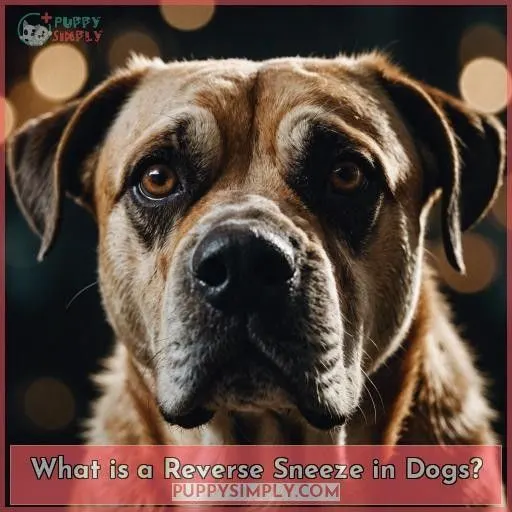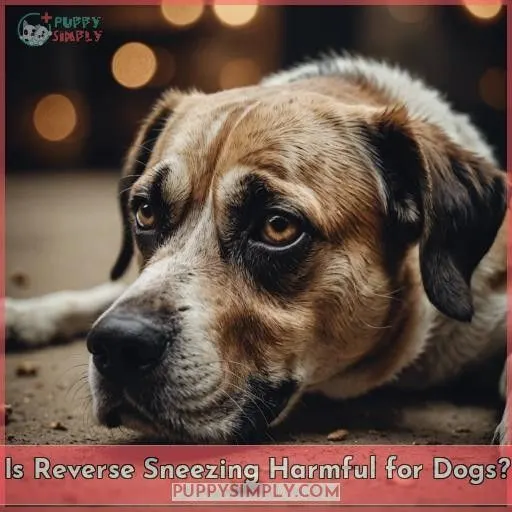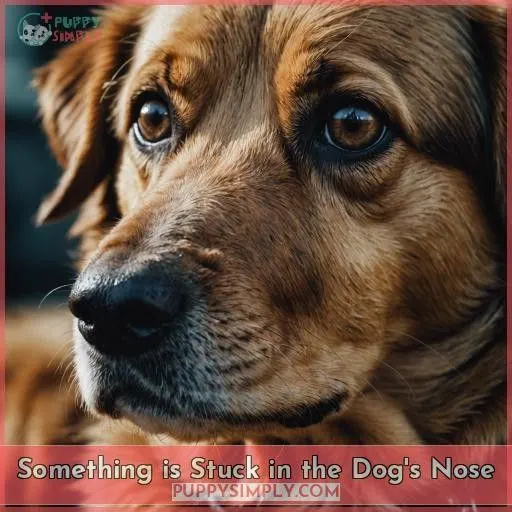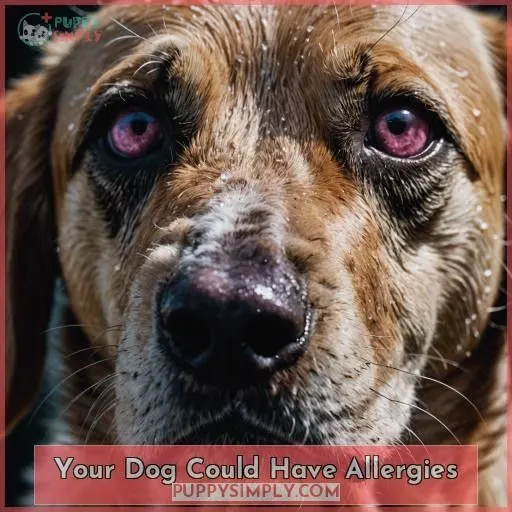This site is supported by our readers. We may earn a commission, at no cost to you, if you purchase through links.
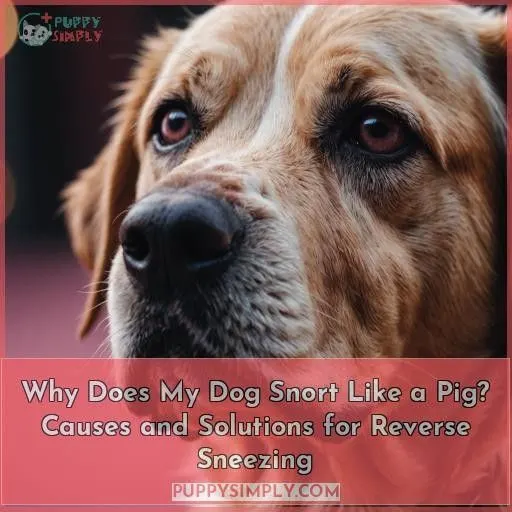 If your dog snorts like a pig, it’s likely experiencing a reverse sneeze – a sudden, harmless episode of rapid inhalation through the nose.
If your dog snorts like a pig, it’s likely experiencing a reverse sneeze – a sudden, harmless episode of rapid inhalation through the nose.
This snorting occurs when an irritant like dust, pollen, or nasal mites triggers spasms in your dog’s soft palate.
Reverse sneezing is usually brief, with no lasting effects. However, if your dog develops discharge, labored breathing, or the snorting persists, it may signal an underlying condition requiring veterinary attention.
Certain breeds, like pugs with their shortened snouts, are more prone to reverse sneezing.
So while annoying, the snort-like sound is typically no major cause for concern – but don’t hesitate to consult your vet for prolonged episodes.
Table Of Contents
Key Takeaways
- Reverse sneezing is a harmless condition where dogs rapidly pull air in through their noses, causing a snorting sound. It’s usually brief and doesn’t require treatment.
- Reverse sneezing can be triggered by irritants like dust, pollen, or nasal mites, or anatomical issues like an elongated soft palate. Certain breeds like pugs are more prone to it.
- While reverse sneezing is generally not harmful, it can indicate an underlying health problem if accompanied by symptoms like nasal discharge, labored breathing, or persistent snorting. Consult a veterinarian if episodes are frequent or concerning.
- Brachycephalic breeds with short snouts like pugs are prone to snorting and snoring due to their compressed facial anatomy. Surgery may be recommended in severe cases to improve airflow.
Why Does My Dog Snort Like a Pig?
Dogs snort like pigs due to reverse sneezing, which is caused by irritation or inflammation of the nasal, pharyngeal, or sinus passages. Reverse sneezing is characterized by a loud snorting sound and is usually not harmful, but may point to an underlying health problem if sudden onset.
What is a Reverse Sneeze in Dogs?
You’ve likely witnessed your dog engage in a strange behavior where they rapidly pull air in through their nose, make loud snorting sounds, and raise their head while extending their neck. This phenomenon, known as a reverse sneeze, typically lasts less than a minute and can be alarming for pet owners.
Rapidly Pulling Air in Through the Nose
When your dog reverse sneezes, they rapidly pull air in through their nose, often due to nasal irritation from a foreign body, sinus infection, pollen sensitivity, or allergic reaction. This sudden intake of air can be alarming, but it’s usually not a cause for concern. Stay calm and comfort your dog until the episode passes.
Loud Snorting Sound
The loud snorting sound during a reverse sneeze is caused by a rapid inhalation of air through the nose. This sudden intake of air can be alarming, but it’s usually not a cause for concern.
Certain dog breeds, like pugs, are more prone to reverse sneezing due to their short snouts.
If the snorting persists or is accompanied by other symptoms, it’s best to consult your veterinarian to rule out any underlying health issues or allergies.
Raising Head and Extending Neck
During a reverse sneeze, your dog will raise their head and extend their neck as they rapidly pull air in through their nose. This posture is a natural response to the irritation causing the episode. Remain calm and provide reassurance to ease your pup’s anxiety. Gently massage their throat to encourage swallowing and help resolve the reverse sneeze.
Lasts Less Than a Minute
Reverse sneezing episodes are usually over in less than a minute, so try not to panic.
Identify any triggers like dust or pollen, and use calming techniques like gentle petting to soothe your dog.
If snorting persists or you notice other symptoms like wheezing or open-mouth breathing, consult your veterinarian to rule out any underlying issues.
Stay calm and your dog will be fine!
What Causes Reverse Sneezing in Dogs?
Your dog’s reverse sneezing episodes could stem from irritants like dust, pollen, or smoke irritating the nasal passages. It might also be due to anatomical issues like an elongated soft palate or masses obstructing the airways.
Inflammation or Irritation of Nasal, Pharyngeal, or Sinus Passages
Reverse sneezing in dogs often stems from inflammation or irritation of the nasal, pharyngeal, or sinus passages. This can cause your pup to snort like a pig as their respiratory tract becomes aggravated. If your dog’s reverse sneezing is accompanied by labored breathing, lack of interest in exercise, or pale/blue gums, consult your vet promptly.
Dust, Nasal Mites, Seeds, Grass, Pollen, Smoke
Dust, pollen, smoke, and even tiny bugs like nasal mites can irritate your dog’s sensitive airways.
Triggering reverse sneezing fits.
If your pup is prone to allergies or sensitivities, keep their environment clean.
Minimize exposure to potential irritants.
Certain breeds are more susceptible due to their anatomy.
Reverse sneezing is rarely serious unless accompanied by other symptoms.
Like labored breathing or lethargy.
Masses or Elongated Soft Palate
Certain dog breeds like pugs and bulldogs are prone to an elongated soft palate, which can partially block their airways and trigger reverse sneezing episodes. If your pup’s palate is inflamed or obstructing airflow, soft palate surgery may be recommended to trim the excess tissue and improve breathing. Consult your vet about treatment options for an elongated palate.
Over-excitement
Over-excitement can trigger reverse sneezing episodes in dogs. To soothe your pup during an attack:
- Remain calm and provide a quiet, calming environment
- Offer distracting treats to shift their focus
- Gently massage their throat to encourage swallowing
Attempt to Remove Irritant
Your dog’s reverse sneezing is likely their body’s way of clearing irritants from their nasal passages. Things like dust, pollen, or even an elongated soft palate can trigger this reflex. Staying calm and distracting them with a treat or toy can help soothe them during an episode. But if it persists, consult your vet.
| Irritant | Symptom | Solution |
|---|---|---|
| Dust | Sneezing | Vacuum frequently |
| Pollen | Itchy eyes | Use air purifier |
| Soft palate | Chronic sneezing | Consider surgery |
| Over-excitement | Frequent episodes | Avoid triggers |
Is Reverse Sneezing Harmful for Dogs?
Reverse sneezing in dogs is generally harmless and doesn’t pose any health risks. However, if it occurs suddenly or frequently, it may indicate an underlying condition that requires veterinary attention.
Usually Not a Concern
Reverse sneezing is usually not a health concern for dogs. While it may look alarming, episodes are brief and your pup will be back to normal in no time. However, frequent reverse sneezing could indicate an underlying issue like allergies or irritation. If it persists, consult your vet. In the meantime, try these soothing techniques:
- Gently massage your dog’s throat to encourage swallowing
- Blow lightly in their face to trigger a swallow reflex
- Offer a treat or water to distract and calm them
- Speak soothingly and pet them to ease anxiety
- Keep their environment clean to minimize irritants
No Health Repercussions
Reverse sneeze episodes may look alarming, but they don’t cause any lasting harm to your pup. As a pet parent, try not to panic – your dog is just fine! A gentle head massage or offering a favorite toy can help soothe anxiety during an episode. If sneezing persists, consult your vet to rule out underlying health issues.
Can Shake It Off Like Nothing Happened
Most dogs simply shake off a reverse sneeze episode like it never happened. However, if your pup’s reverse sneezing starts suddenly, it could signal an underlying health issue. Stay calm, pet gently, and use calming techniques to reduce anxiety. If sneezing persists, consult your vet to rule out any serious problems and provide reassurance for your furry friend.
May Point to Underlying Health Problem if Sudden Onset
While reverse sneezing is usually harmless, a sudden onset may signal an underlying health issue. Respiratory infections, inhaled foreign objects, or collapsing trachea can cause snorting. If your pup’s snorting is accompanied by wheezing, coughing, or labored breathing, consult your vet. With proper treatment, your furry friend can get back to their happy, healthy self in no time!
Something is Stuck in the Dog’s Nose
If your dog is exhibiting signs of discomfort like nasal discharge, labored breathing, snuffling noises, or drooling, there’s a possibility that a foreign object is stuck in their nose. These symptoms indicate an obstruction causing inflammation and irritation, so it’s advisable to have your veterinarian examine your dog promptly.
Discomfort and Inflammation
If your dog is snorting and seems uncomfortable, they may have something stuck in their nose. Nasal mites, an elongated soft palate, or masses blocking the nasal passage can all cause irritation and inflammation. Your pup may be trying to remove the irritant by snorting. Keep an eye out for any discharge, and see your vet if the snorting persists.
Nasal Discharge
If your dog’s snorting is accompanied by nasal discharge, it could indicate something is stuck in their nose, causing discomfort and inflammation. Look for signs like snuffling noises, drooling, or panting. To help, try gently blowing into their nose to dislodge the object. If symptoms persist, consult your vet about nasal congestion treatments like antihistamines or nasal sprays.
Labored Breathing
If your dog is struggling to breathe, it could be due to an object stuck in their nose. Look for signs like discomfort, nasal discharge, and snuffling noises. Chronic bronchitis, asthma, pneumonia, lung cancer, or heart disease may also cause labored breathing. If your pup seems distressed, get them to the vet right away for proper diagnosis and treatment.
Snuffling Noises
If your dog’s snuffling is accompanied by nasal discharge, it could indicate something stuck in their nose. Snuffling is a sign of discomfort and inflammation in the nasal passages. Nasal mites or irritation from dust or grass can also cause snuffling. Consult your vet if the snuffling persists or your dog seems in distress.
Drooling or Panting
If your dog is drooling or panting excessively, it could be a sign that something is stuck in their nose. Along with the drool and heavy breathing, you may notice:
- Discomfort and inflammation in the dog’s nose
- Nasal discharge
- Labored breathing
- Snuffling noises
Don’t delay – get your pup to the vet right away if you suspect a foreign object in their nasal passages. Their comfort and health depend on it!
Your Dog Could Have Allergies
If your dog snorts excessively during certain seasons, it could be a sign of allergies causing irritation and inflammation in their airways. Red, itchy eyes, skin rashes, and excessive paw licking often accompany snorting due to allergies in dogs.
Irritation and Inflammation of Airways
Nasal mites, pollen exposure, and chronic sinus inflammation can trigger an inflammatory response, causing your dog’s airways to become irritated and swollen. This leads to reverse sneezing episodes as your pup tries to clear the irritation. Consult your vet if snorting persists or worsens to rule out underlying allergies or infections.
Snorting During Specific Seasons
If your dog’s snorting seems to coincide with certain times of year, seasonal allergies could be the culprit.
Pollen, grass, and other airborne allergens can trigger inflammation and irritation in your pup’s airways, leading to snorting fits.
Collaborate with your veterinarian on allergen identification, seasonal triggers, and allergy management customized to your dog’s breed predisposition.
Environmental control, such as keeping windows closed, can also help minimize exposure to seasonal allergens.
Red Eyes
If your dog’s eyes are red, watery, and have a discharge, they may have allergies. Allergens like pollen can irritate your pup’s eyes, causing discomfort. To help, wipe their eyes gently with a damp cloth to remove discharge and keep the area clean. If symptoms persist, consult your vet about allergy medication to provide relief.
- Wipe eyes gently with a damp cloth to remove discharge and keep the area clean.
- Consult your vet about allergy medication if symptoms persist.
- Avoid touching or rubbing your dog’s eyes to prevent further irritation.
Itchy Skin Rashes
Itchy skin rashes are another sign your dog may have allergies. The skin becomes irritated and inflamed, leading to excessive scratching. Skin allergies can be caused by environmental triggers like pollen or dust mites. Treating the underlying allergy with medication and avoiding triggers can help soothe your pup’s itchy skin. Proper skin care is key to managing allergies.
Excessive Paw Licking
If your dog is licking their paws excessively, it could be a sign of allergies.
Allergic dermatitis causes itching and irritation, leading to excessive scratching and licking.
Consult your veterinarian to determine the cause, whether it’s environmental, food-related, or something else.
With proper treatment, you can help your pup find relief from the itching and get back to being their happy, healthy self.
The Breed of the Dog
If your dog is a brachycephalic breed like a pug or French bulldog with a short, upturned snout, frequent snorting and snoring is common due to their compressed respiratory anatomy. In severe cases, surgery to widen the nostrils or shorten the soft palate may be recommended by your veterinarian to improve airflow and reduce snorting.
Short or Upturned Snouts
If your pup has a cute, upturned snout like a Pug or Bulldog, snorting and snoring may be expected.
These short-nosed breeds often struggle with breathing.
Keep an eye out for signs of distress.
Consult your veterinarian if your French Bulldog’s breathing seems labored or if you have concerns about their health.
Proper care is key for short-snouted sweethearts.
Brachycephalic Dogs (e.g., Pugs)
If your pup has a short or upturned snout like a pug, snuffling and snorting may be a common occurrence. These brachycephalic breeds often face breathing difficulties due to their unique facial features. While it may sound alarming, it’s usually not a cause for concern. However, in some cases, surgical intervention may be necessary to improve airflow and breathing comfort.
Snorting and Snoring Common
If you own a pug, you know their cute, smushed faces come with some breathing challenges. Their short snouts and narrow nostrils make snorting and snoring a common occurrence. While it may sound funny, it’s a sign of their brachycephalic anatomy. With breed-specific care and understanding, you can help your pug breathe easier.
May Require Surgery to Improve Airflow
If your dog’s breed is prone to snorting, like pugs or French bulldogs, they may need surgery to improve airflow. Brachycephalic dogs have short snouts, narrow nostrils, and elongated soft palates, causing discomfort. Surgery can help:
- Widen nostrils
- Shorten soft palate
- Improve breathing
Consult your vet to determine if your dog would benefit from these procedures to breathe easier and reduce snorting.
Frequently Asked Questions (FAQs)
How can I stop my dog from snorting?
Forsooth, snorting may signal an underlying issue. Identify triggers – allergies, obesity, or infections – and address the root cause with thy veterinarian’s guidance. Meanwhile, distract with treats or massages during episodes.
Is dog snorting a sign of pain?
Sometimes, snorting can indicate pain or discomfort, but it’s not always serious. If it’s occasional and your pup seems fine otherwise, it’s likely no cause for alarm. However, frequent snorting accompanied by lethargy or difficulty breathing warrants a vet visit to rule out underlying issues.
Why does my dog snort when excited?
Your pup’s excited snorting? It’s an instinctive reaction—their respiratory system revs up, forcing air out rapidly through the nose. While noisy, it’s completely harmless and just means they’re keenly anticipating something awesome, like walkies or treats!
Can dog snorting be a sign of illness?
Yes, dog snorting can indicate illness. While sometimes normal, frequent snorting may signal respiratory issues like infection or obstruction, requiring a vet’s attention. Don’t ignore persistent snorting in your furry friend.
How often is normal for a dog to snort?
Some snorting is normal for dogs, but it shouldn’t happen frequently. If your pup snorts more than a few times a day, it could signal an underlying issue — time to see your vet!
Conclusion
Around 25% of dogs experience reverse sneezing at some point.
While hearing your dog snort like a pig can be alarming, it’s usually harmless.
However, if the episodes persist or involve discharge and labored breathing, consult your vet as it could signal an underlying condition.
For brachycephalic breeds prone to reverse sneezing, speak with your vet about potential surgeries to improve airflow and prevent future episodes.

